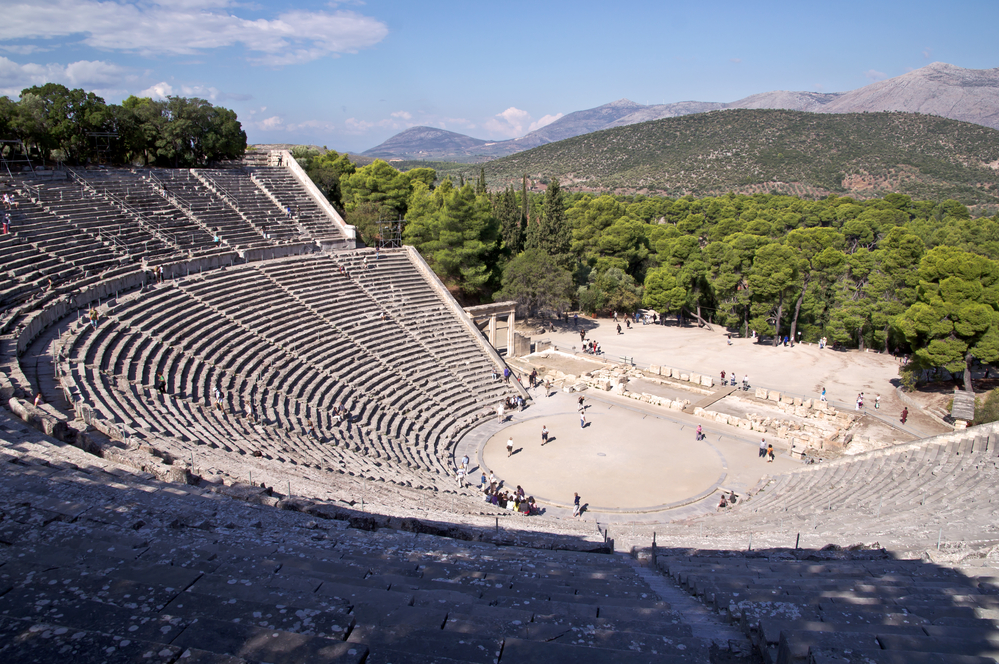If you ever visit Greece in the summer, do not miss the opportunity to enjoy a play in an ancient Greek theatre. You would enjoy a unique experience under the starry sky in the place where the theatre was born. Greece.
But how did it all start?
The theatre was born in the early 6th century B.C and is related to the cult of god Dionysus, god of wine and fertility. The ancient Greeks venerated Dionysus in the hope of a better crop and prosperous year. For this reason, people chanted the “dithyramb”, an improvised hymn in honor of the god, dancing next to his altar and dressed up as “satyrs”, half-men and half-goats, imitating the attendants of the god according to the Greek mythology. In Greek, the word “tragos” means “goat” and this is where the word “tragedy” comes from, since people sang the hymn – ode of the goat, the “dithyrumb” disguised as such.
In the middle of the 6th century, a popular lyric poet called Arion, composed for the first time a melody of the dithyramb so as to be presented as a play before the audience. The people who chanted the hymn were part of a group called “chorus” consisted of 50 men. Nevertheless, the most innovative movement that led to the birth of tragedy, was the introduction of spoken verse by Thespis, in the form of a dialogue between the first of the chorus and the rest of it. These dialogues were related to the myths of Dionysus and consisted of several questions and answers. This is how the word “hypocrite” was created. Although the term “hypocrite” is widely used to describe someone that pretends to be someone else or not being honest, the same term was used in ancient Greek for the word “answerer” or “interpreter”. In modern Greek, the term is used for the word “actor”. Thus, Thespis is considered to be the first actor in history being the first character in a play!
The tyrant of Athens Peisistratus, established the first religious festival in honor of Dionysus called “Dionysia” in 534 B.C. During the great festival of Dionysia that took place from mid-March to mid-April, several theatrical performances such as tragedies and comedies were shown, especially after 486 B.C. The festival would begin with the transfer of Dionysus wooden idol from Eleftheres, a village near Boeotia to Athens. People followed the procession chanting the dithyramb, drinking wine and teasing each other with spicy comments. This parade called in Greek “komi –“κώμη”, and this is where the word “comedy” came from.
The “Dionysia” festival included the greatest theatrical competition of the city of Athens and this is when the best play would be awarded at the end of the games. Each theatrical performance should be funded adequately to cover all the needs required and wealthy people used to offer the relevant funding. They were called “sponsors”, “χορηγός” in Greek. (chorigos).
The festival along with the theatrical performances lasted about 5 days and the Athenians would spend all day at the theatre starting from the sunrise until the sunset. Despite the fact that the performances took place under a religious framework and the plays depicted the myths of Dionysus, from the 5th century B.C., -when democracy flourished for the first time in world history- the poets started to write about issues of political nature. They were interested in the relation of the citizen with the City and of humans with gods. What were the limits of a human being and what would happen in case of surpassing them? The main characters of a play should face fate and destiny and they couldn’t escape from the consequences of their deeds.
The common pattern at the end of the ancient Greek tragedy is “catharsis”. Catharsis was a kind of justice which had nothing to do with the compassion towards the protagonists and their personal drama as it happens in Hollywood. It was the prevalence of ethics and morals of that time and always had a pedagogical meaning towards the audience.
Aeschylus, Sophocles and Euripides are considered to be among the greatest tragic poets and their plays constitute a landmark for the global cultural heritage as they convey eternal meanings and truths about the human nature.
